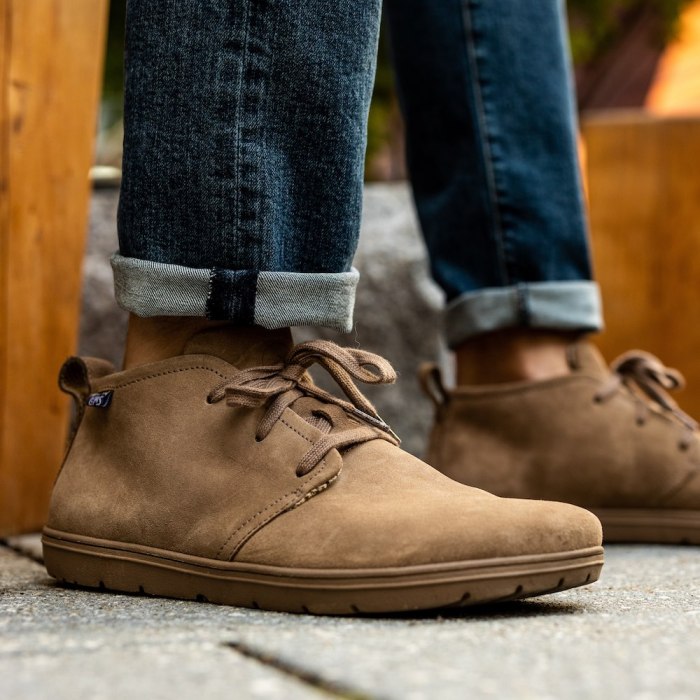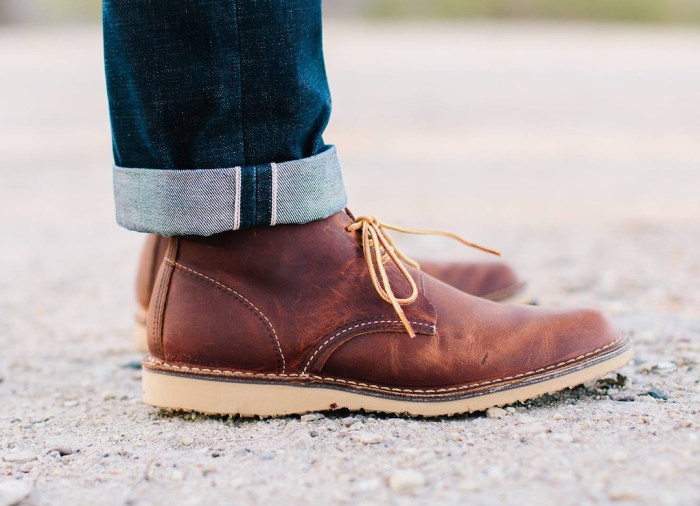Chukka Boot Styles & Variations

Men’s fashion chukka boots – Chukka boots, a staple in men’s footwear, offer a versatile blend of style and practicality. Their enduring popularity stems from their adaptability to various occasions and their timeless design. This section delves into the diverse styles and construction methods that contribute to the chukka boot’s multifaceted appeal.
Chukka Boot Styles: A Detailed Overview, Men’s fashion chukka boots
The following table categorizes various chukka boot styles based on material, ankle height, and distinctive features. Understanding these variations allows for informed choices based on personal style and intended use.
| Style Name | Material | Ankle Height | Notable Features |
|---|---|---|---|
| Classic Chukka | Leather (various types) | Mid-ankle | Simple design, versatile, often features two or three eyelets |
| Suede Chukka | Suede (various colors and textures) | Mid-ankle | Softer texture, more casual feel, prone to staining |
| High-Top Chukka | Leather or Suede | Above ankle | Offers more ankle support, often seen in rugged styles |
| Desert Boot (a type of Chukka) | Suede, typically light brown or beige | Low-to-mid ankle | Crepe sole, minimal stitching, casual and informal |
| Leather Chukka with Brogue Detailing | Leather | Mid-ankle | Formal or semi-formal look, features decorative perforations |
Chukka Boot Construction Methods
The construction of a chukka boot significantly impacts its durability, comfort, and overall aesthetic. Different methods utilize varying stitching techniques, sole attachment processes, and materials.Several key construction aspects include the stitching method (Goodyear welted, cemented, or Blake stitched), the type of sole (leather, rubber, crepe), and the quality of the leather or suede used. Goodyear welted boots, for example, are known for their durability and repairability, while cemented construction offers a more affordable option.
The choice of sole material also affects the boot’s traction, durability, and overall style. A leather sole offers a more formal look but requires more care, while a rubber sole is more durable and practical for everyday wear.
Aesthetic Differences: Formal vs. Casual Chukka Boots
Chukka boots occupy a unique space in footwear, bridging the gap between formal and casual styles. The choice of materials, colors, and construction methods significantly influences their perceived formality.Generally, leather chukka boots with a polished finish and leather soles are considered more formal, suitable for business casual or smart casual settings. They can be paired with tailored trousers and a blazer.
Yo, chukka boots are totally a classic, right? They’re like, super versatile, you can rock ’em with anything. But seriously, if you wanna see how fly chukkas looked back in the day, check out this awesome 1920 mens fashion party site – those dudes knew how to dress! Then you can totally step up your chukka game, know what I mean?
Conversely, suede chukka boots, particularly desert boots with crepe soles, tend towards a more casual aesthetic, ideal for jeans and a shirt. Variations in color also play a role; darker colors often lean towards formality, while lighter colors tend to appear more relaxed. The presence of brogue detailing can elevate a chukka boot’s formality, while a minimalist design contributes to a more casual look.
Illustrative Examples of Chukka Boots

Chukka boots, with their versatility and timeless appeal, come in a wide array of styles, each offering a unique blend of design, material, and aesthetic. Understanding these variations allows for a more informed choice when selecting the perfect pair to complement one’s personal style.
Three Distinct Chukka Boot Examples
Let’s examine three distinct examples to highlight the breadth of chukka boot design. First, imagine a classic suede chukka in a rich, deep brown. The suede is supple and soft to the touch, exhibiting a subtle nap that catches the light. The stitching is neat and consistent, showcasing quality craftsmanship. A leather sole provides both durability and a refined look, ideal for smart-casual occasions.
The overall aesthetic is one of understated elegance and timeless sophistication.Next, consider a more rugged chukka crafted from full-grain leather in a dark olive green. This boot features a thicker sole, perhaps a crepe rubber sole, offering superior grip and durability. The leather is more textured, showing natural markings and a slightly tougher feel, suggesting a boot built for more adventurous pursuits.
The laces are robust, perhaps in a contrasting waxed cotton, and the overall impression is one of practicality and resilience.Finally, envision a chukka boot made from smooth, polished black leather. This boot is sleek and refined, embodying a minimalist aesthetic. The stitching is minimal, almost invisible, and the leather is impeccably smooth, reflecting light with a subtle sheen.
A thin leather sole contributes to the boot’s refined look, making it a perfect choice for formal occasions or those seeking a sophisticated edge.
A Hypothetical Chukka Boot Design
Imagine a chukka boot constructed from a rich burgundy suede, accented with contrasting dark brown leather detailing on the heel counter and eyelets. The suede itself would have a slightly pebbled texture, adding depth and visual interest. The laces would be a waxed cotton in a deep brown, complementing the leather accents. The sole would be a lightweight, yet durable rubber, offering both comfort and grip.
A subtle embossed pattern on the heel counter, perhaps a stylized leaf or geometric shape, would add a unique touch. This combination would create a boot that’s both stylish and comfortable, suitable for a range of settings.
The Impact of Design Elements
The choice of stitching, lacing, and sole type significantly impacts a chukka boot’s overall appearance and feel. Visible, decorative stitching can add a handcrafted feel, while minimal stitching creates a sleeker, more modern look. Thick, robust laces suggest durability and a rugged aesthetic, while thinner, more refined laces contribute to a more polished appearance. Finally, the sole type—from a classic leather sole to a durable rubber sole—dictates both the boot’s functionality and its overall aesthetic.
A leather sole offers a refined look but less durability, while a rubber sole prioritizes comfort and grip. These seemingly small details contribute significantly to the character and personality of the chukka boot.
User Queries: Men’s Fashion Chukka Boots
What’s the difference between chukka boots and desert boots?
While both are ankle-high boots, chukka boots typically have a more structured build, higher quality leather, and often feature more robust stitching. Desert boots tend to be simpler in design and use softer leather.
How do I clean suede chukka boots?
Use a suede brush to remove dirt and debris. For stubborn stains, consider a suede cleaner. Avoid getting them wet.
Are chukka boots good for all weather?
It depends on the sole material. Leather soles are best for dry conditions, while rubber soles offer better traction in wet weather.
Can I wear chukka boots with a suit?
Yes, but choose a darker color like brown or black, and ensure the boots are in good condition and well-polished. Avoid chunky soles for formal wear.
